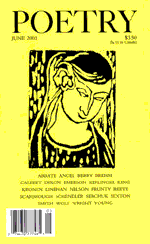| F.D. Reeve, Poetry magazine:
...Usually, in fact, like
Diane Thiel, winner of the thirteenth annual Nicholas Roerich Poetry prize,
one doesn’t love the past either:
The language
of our dreams contains
the places we can
never name again
without the shame...
It will take many
lifetimes to reclaim
this language of my
childhood.
But Thiel loves the language
she does have; she’ll use it to make poetry out of a different time and
place. “We live today those stories we were told,” she writes, for the
imagination has regenerative power. By making people conscious and
articulate, it can redeem them from error.
The fairy tale fantasy, in
which everyone has a significant, or responsible, role is truer to the
possibilities of human nature than is the collation of facts called history,
which people in the present use to dissociate themselves from the past.
Seriously speaking, time is a holding pattern of events, “all this history”
— metaphorically, a quilt recut and restitched by each participant.
The patches are public fields; the seams carry years of “careful secrets.”
The intellectualized conceit allows Thiel to assert the propriety of the
intension of her verse, the effective completion of the verbal play.
Verse it is, as handsomely
witnessed by “Love Letters,” a gentle — one might say “family” — sestina
on an old topic made poignantly new. The poet’s father is German;
her mother isn’t but wants to learn the language the children, also, speak;
she studies and, to prove her progress, writes her husband love letters
in German, which he “never answered” but “returned...with his German /
corrections in the margin, his little / red marks — hieroglyphs for her
to translate, / as if she were one of the children.” Thiel’s compassion
floods the envoi with its unspeakable ironic close:
Because her own
children were half-German,
she built her life around
those little books
translating the lines of
her own letters.
Skill at distancing —
moving from a simple, involved moment to a wry, repositioned overview,
thereby allowing the emotional experience to endure in the language and
to be available to every reader — is evident throughout the book, perhaps
most rewardingly in anecdotal poems such as “Textiles.” “Textiles”
begins with eighteen casual, loose iambic lines describing how father and
children made bed covers of a bolt of thick purple cloth found on a beach.
The next six lines summarize the bedtime story the father told about sleeping
alone in the woods on a fresh rabbit skin and parachute silk during World
War II. Then, envoi-like, three lines close the poem by refocusing
it, lifting it out of time altogether:
And what he chose
to speak about, that time — how soft it was,
like nothing he had ever
felt — he said,
it was such beautiful material.
It takes a keen intelligence
to draw forth the power in simplicity.
Not all conceits are fruitful.
For example, in “Letters from the Garden,” “poems stretching their limbs
/ inside these letters” in Section I seems fetched, a false artifice, but
by Section IV the impulse driving the poem has become impassioned and,
though finally vague, reverberant:
I want to lie with
you in this garden,
feel it cool around us when
we become
this loam, as we have every
tree
you’ve loved me up against
—
the earth full of us as
we are full,
our seeds covered
with the dark life of it.
Intellectually, the poem is
achieved. I suppose its persuasiveness depends on its reader’s willingness
to join in sharing the role of “you,” but the poet has provided an imaginative
avenue into the poem.
Her poems come with epigraphs
from Schiller and Yeats to Hayden and Szymborska, but especially pleasing
is to see a section introduced by a quote from Louise Bogan. American
tradition lives. And it throbs and pulses in the final poem, “Echolocations,”
based on conceiving a whale skeleton on a beach as a house into another
world, a vehicle along the whale’s way itself, the instrument of the sea’s
singing and of singing to the sea,
The calls reverberating
through the waters
to navigate the depths,
to guide us through
one ocean to another, the
dark indigos,
the song returning
from the deepest blues.
In this crafted verse,
even a light pun gathers the weight of honest ambiguity.
|
 |